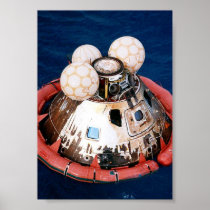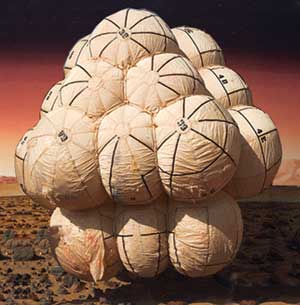hobbsyoyo
Deity
- Joined
- Jul 13, 2012
- Messages
- 26,575
Ever seen this picture?:But minerals are heavy, and flotation devices capable of resisting reentry are not going to be created from materials mined and transformed in space. Seems to me that they'd end up lost at sea, with the expense of searching and recovering them afterwards. We might as wellmine the seabed.

You don't store the flotation devices on the outside. And actually, you can engineer re-entry shields that double as heat shields, NASA has researched this. But that's a whole other discussion. Flotation device =/= fragile, flammable or non-heat resistant.
I believe the ring around the capsule in the picture above was added by divers, but the three balls that kept the capsule upright were internal. Here's the airbags that survived reentry for the spirit and opportunity rovers:

They survived reentry and impact with Mars. They safely bounced the rovers to a stop. They would have floated the rovers on Earth's oceans if that had been the target.
There was quite a few posts from me on why this isn't the case. For one thing, it's not necessarily that expensive to send the kind of mining equipment you need to mine an asteroid out to an asteroid (relative to starting a new mine on Earth - for examples on why this is so, read the whole thread). There are lots of other reasons in this thread, please read them if you're geniunely interested. I posted quite a bit already.The return of materials to Earth is appearing to be as difficult (or even more) than sending away the equipment in the first place. It won't make economic sense unless those minerals on Earth are totally exhausted.
Remember, the only reason some minerals are rare is because they are expensive to mine in Earth. There are lots more around if we are willing to invest enough energy to separate them. Between something as costly as separating them from seawater (as the japanse were considering to get uranium), or going to the asteroid belt, my money will be on the seawater!
No, many minerals are rare. They're called rare-earth minerals for a reason.

Also, a big benefit of asteroid mining is that you can get at huge quantities of rare and/or expensive minerals far cheaper than on earth. An added benefit of bringing back all these quantities of previously rare materials would be crashing their value. I know this seems counterintuitive, but think of all the things you own (like electronics, cars, etc.) that contain cheap substitutes for the gold, platinum, molybdenum and other elements because they are so expensive.
We could have better, cheaper, more ubiquitous everything if the optimal source materials didn't cost a fortune. BTW, did you know that aluminum used to be more precious than gold or platinum?
Imagine a world where this still was the case, then imagine a world where gold and platinum are abundant.
As for seperating seawater for elements, you don't understand the magnitude of that task, just as you didn't understand the nature of floatation devices in spacecraft. Please understand that I'm not insulting you, just laying things out as an engineer.
Have I changed your mind yet?
